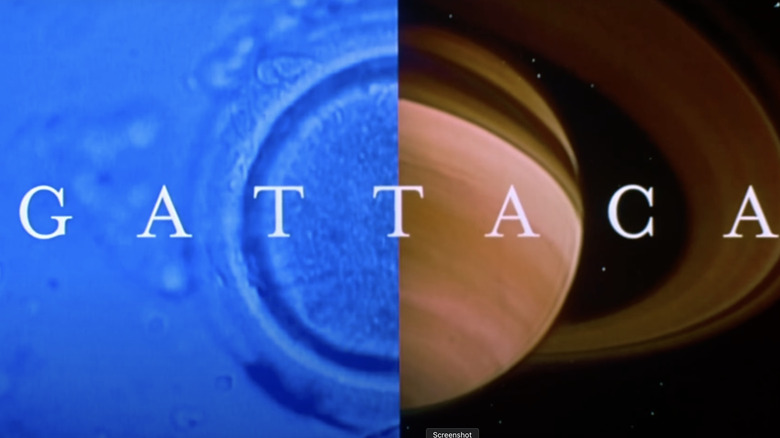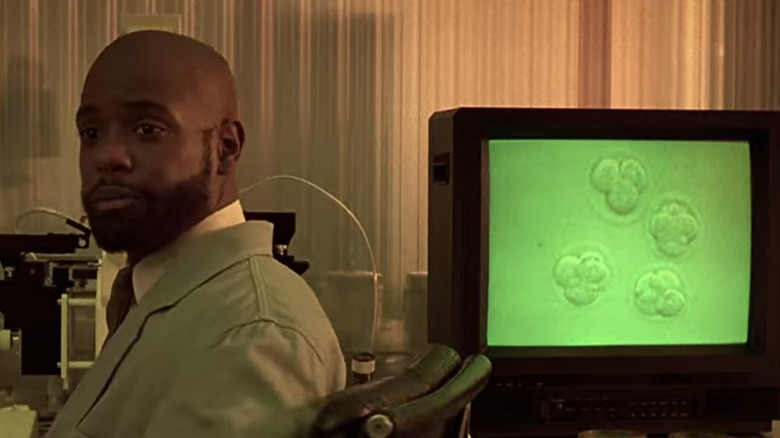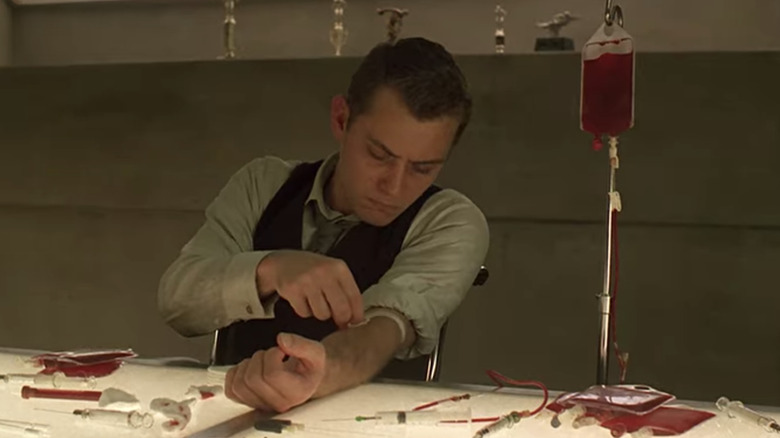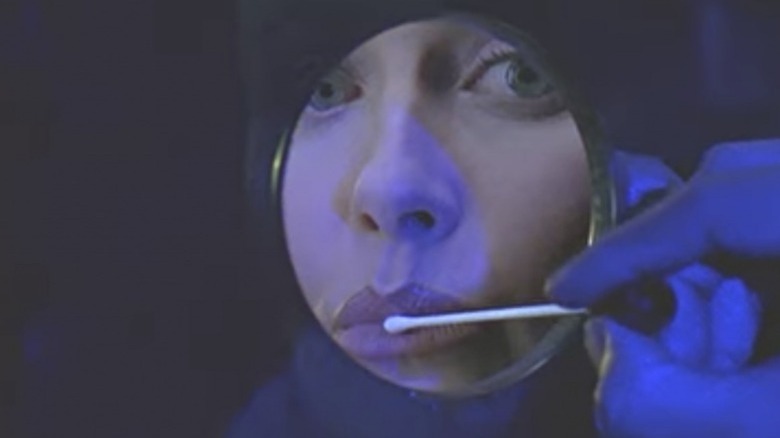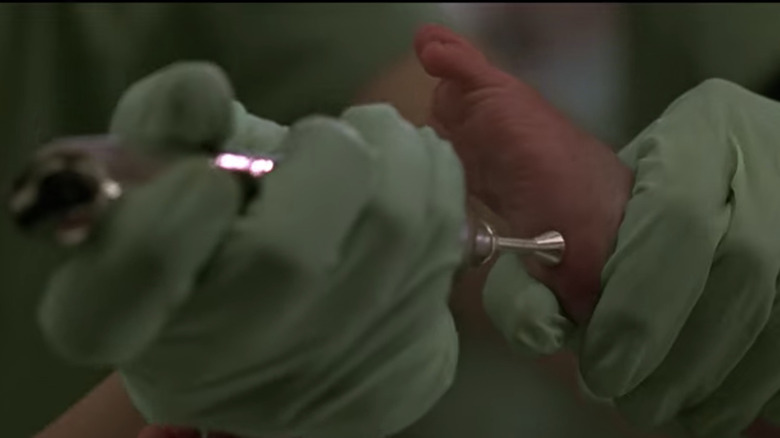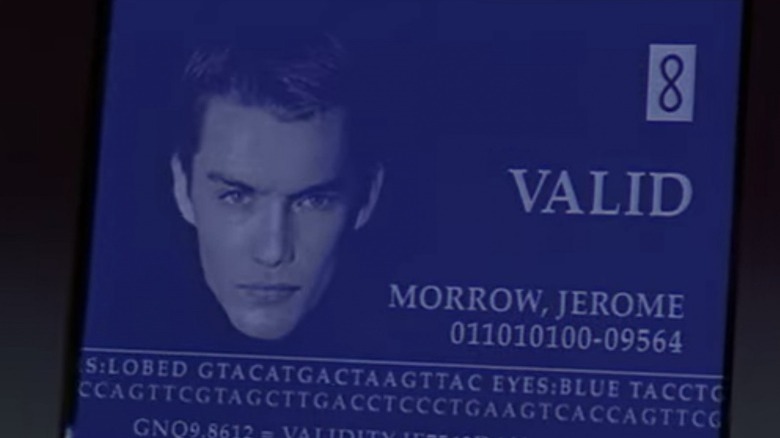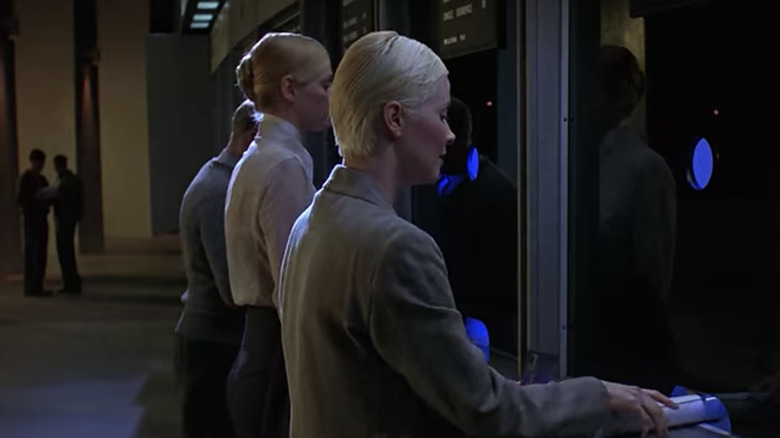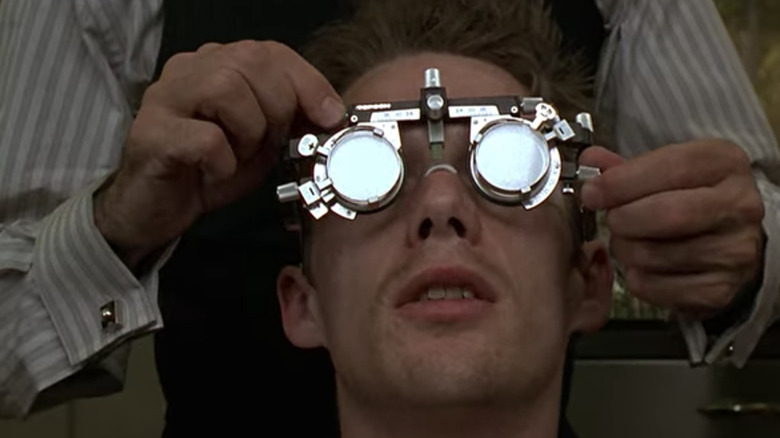The Truth About The Movie NASA Calls Most Plausible
NASA named 1997's "Gattaca" as the most plausible sci-fi movie, as it is more likely to come to pass than a Skynet cyborg takeover. There are plenty of arguments to support why NASA would come to this conclusion. The sci-fi thriller is set in a near-distant future where humans can edit their genes for perfection. The protagonist, Vincent, was born through traditional procreation methods and is deemed "in-valid." Children who have been genetically enhanced are classified as "valid" and have access to higher standards of living.
In his journey, Vincent defies the predetermined limitations designed to keep him on the fringes of society by assuming the identity of Jerome Eugene Morrow (or Eugene to avoid confusion), a valid who was rendered disabled in a car accident. Vincent must adhere to a strict ritual of discarding his DNA and diligently sprinkling Eugene's tissue samples to maintain the ruse.
In this fictional reality, DNA defines everything, including a person's rights and privileges in society. Eugene lends Vincent his DNA so Vincent can complete a rigorous astronaut training program. Just before a scheduled launch, a murder scene at the facility threatens to expose him as an imposter and ruin his dream of space flight.
"Gattaca" is perhaps more relevant today in light of the advancements happening with genomics and commercial space flight. The film was released in the middle of the Human Genome Project, which was mapping the human genome from 1990 to 2003. All living organisms have a genome, and it encompasses all of DNA. Today it's possible for scientists to create "designer babies" and use gene-editing tools such as CRISPR-Cas9 to replace genetic codes.
What does CRISPR have to do with genomes?
It's not just the drawer in your refrigerator, it is also the pronunciation for a gene-editing tool, CRISPR, which stands for "clusters of regularly interspaced short palindromic repeats." According to the Broad Institute, Spanish researcher Franscio Mojica of the University of Alicante is credited for discovering repetitive sequences in DNA in the early 1990s. He named it in 2002 while communicating with a fellow scientist.
Researchers can use it along with Cas9 (a protein that is used to cut DNA) to modify genetic material. Live Science reports that CRISPR technology was derived from the defense system of bacteria and a single-celled organism called archaea. Essentially these organisms can head off virus attacks by weaponizing the viruses (similar to how a vaccine works), cutting up their DNA and storing those bits away for use as defense later. Scientists use this process to cut out specific genes and replace them with the desired traits.
Within the context of "Gattaca's" storyline, it can be assumed they streamlined the process beyond our current limits. Parents donate genetic material, and after the doctors cull the least fertile of the samples, parents can customize the final product.
Scientists are editing genes to prevent disease
The geneticists in "Gattaca" just assumed all parents wanted to edit out predispositions to genetic disease. There's a scene where Vincent's family meets with a geneticist to plan his future sibling. The geneticist even presents his parents with four embryos already scrubbed clean of "prejudicial" conditions like bad eyesight, obesity, and premature balding ... because as the geneticist put it, "You want your child to have the best start. We have enough imperfection built in." No pressure, right?
Currently, scientists are able to perform gene editing to prevent some diseases. In 2015, British doctors successfully used a gene-editing technique called TALEN to remove leukemia from a baby girl, as per Popular Mechanics. They genetically engineered T cells from a donor and programmed them, in a sense, not to attack the child's immunity.
The most well-known controversial example of this practice is the work of Chinese scientist He Jiankui editing human embryos. He lead a team that implanted two embryos (that were modified to be resistant to HIV) via IVF into a participant's uterus. CNN reports that the pregnancy resulted in twin girls, and experts say they do not know if the procedure was safe or what effect it will have on the girls as they mature.
Gene-editing has been used on patients with sickle cell anemia as of 2019, as per NPR. Researchers are also using CRISPR to repair cells affected by muscular dystrophy. It's a prime condition for this technology since the disease is caused by a single gene (via Popular Mechanics).
The film predicted the ease of genetic testing
People were always interested in learning about their genes and ancestry. According to Time, as far back as the 1920s, the public has wondered about genetics (albeit from a eugenics standpoint). At the time, people were fascinated by the ability to determine paternity using blood tests. Fast-forward to the 1990s and daytime reality TV, Maury Povich and Jerry Springer were making a mockery of the practice.
Recently, services like 23andMe and AncestryDNA have made genetic testing more accessible, much like in "Gattaca." The market for consumer genetic testing is estimated to be worth $340 million as of 2022 (via Statista). These services take a saliva sample and, depending on what you signed up for, you can receive data on everything from preexisting conditions, regional genetic ancestry data, and other information.
Now, unlike in the film, these modern tests are not as in-depth due to how they acquire your sample. There is one scene in "Gattaca" where Irene, Vincent-slash-Jerome's love interest, takes one of his planted hairs to a testing kiosk. She was able to learn every detail about Jerome's abilities and traits all without his consent. In real life, when you send off your saliva sample, it does not provide a complete look at your genome, as the Conversation reports. The service only compares data from SNPs (the genes responsible for traits that make people unique). But their accuracy has been criticized, with incidents where identical twins have recieved different ancestry DNA results.
Bioethical concerns raised in the film
There are a few ethical issues that crop up in "Gattaca," including informed consent, genome-editing research involving (human) embryos, justice, and equity. Before you can even dive into the actual practice of genome editing, you have to look at informed consent. Experts from the National Human Genome Research Institute say it's not technically possible to get informed consent "because the patients affected by the edits are the embryo and future generations."
Conversely, since it is the parents volunteering for the procedure, these future children are under the behest of their parent's decisions until they reach legal adulthood. The other consent issue lies in the current inability to predict the effects of germline editing (via National Human Genome Research Institute).
The last concern other than the inherent safety of genome editing is justice and equity. The film portrays traditionally conceived people as a subservient underclass. The National Human Genome Research Institute echoes this concern, and experts worry that the cost of the procedure will exclude all but the wealthy. Experts from the organization warn "germline editing could create classes of individuals defined by the quality of their engineered genome."
This is "Gattaca's" issue, as people are easily denied economic opportunities because of their genes. Employers in the film simply take urine from a drug test or stray DNA and determine your genetic "fitness" for a job.
Gattaca's society reveals the extremes of privilege via eugenics
In our current reality, society has numerous layers of stratification (wealth, race, and gender, among them), yet "Gattaca" only has two: the concept of "valid" vs. "in-valid." If the use of CRISPR technology were employed as in the film, it would more likely separate individuals by economics.
"Gattaca" does little to explain how future people can afford to get their children genetically enhanced, but viewers can assume it was accessible to mid-income families (the protagonist was never implied to be from a wealthy family). Right now even with health insurance assuming portions of the overall cost, Forbes reports a single treatment for IVF can carry a price tag between $15,000 and $35,000. If you add in genetic testing, embryo freezing and storage, the price could leap thousands more than the base price.
The film may not explain economic access, but it shows Vincent taking extreme measures to game the system and gain previously shuttered privileges. He actually had his legs surgically lengthened and dental work to look more like Eugene. Likewise, Eugene had to supply Vincent with weekly DNA samples. If they failed, Vincent would've been doomed to clean toilets until he died. With this in mind, one can discern how easily marginalized groups could be shut out of this elite class of enhanced humans. According to Scientific American, CRISPR technology could be a slippery slope, one that can begin with noble intentions and over time descend into eugenics.
Other cool things with gene editing
Despite all the negative media surrounding genome editing, there are other practical ways science uses it. CRISPR can be used to treat diseases, but other applications include the manufacture of pharmaceuticals and making animals and plants more resistant to environmental factors.
For years people have been growing crops selectively to increase food production and reduce the possibility of diseased yields. According to Popular Mechanics, researchers are using CRISPR to develop plants capable of withstanding environmental stress from climate change, as well as generating crops that are heartier and require no pesticides.
Speaking of pests, researchers are also creating mosquitos that are less likely to carry malaria. After scientists sliced a segment of mosquito DNA, the mosquitos' genetic system was "tricked" into replacing it with altered DNA resistant to the parasite that causes malaria (via Popular Mechanics).
Aside from preventing disease, pharmaceutical engineers are using CRISPR in the research phase of development. As per Science Daily, British researchers are in the process of using CRISPR to create new antibiotics. This is big news considering antibiotics are becoming increasingly ineffective as more drug-resistant pathogens emerge (via Mayo Clinic).
Gattaca was right about space flight
One thing that has made "Gattaca" age well was the filmmaker's choice to not make over-ambitious assumptions about what the future could look like. If director Andrew Niccol nailed one thing, it was how routine people planned to make space flights. "Gattaca" is not only the film's title, it's also short for "Gattaca Aerospace Corporation," the setting where all of the dystopia drama plays out. One of Vincent-slash-Jerome's favorite activities is watching every spaceship launch (yes, literally every launch).
In the years since the film was released, the world witnessed the "Billionaire Space Race," most notably Richard Branson and Jeff Bezos investing heavily in commercial space flight. Elon Musk arguably was the first of the ultra-wealthy to work on non-governmental space operations through his company Space X. However, CNN reports Branson was the first of the three "space barons" to make it outside the Earth's atmosphere, followed by Bezos.
Civilians have the ability to travel to space -– however, it's not having perfect genes that will allow you to get out there like in "Gattaca"–- it's money. Currently, voyages are only accessible to anyone willing to pay over $100,000, and that is just to be in a balloon at low Earth orbit for a mere six hours (via the Observer). Should you want to go out even further, space tourists can book a trip orbiting Earth at the ISS with Axiom Space and Space X for the low price of $55 million.
Commercial DNA testing is putting our privacy at risk
As it stands, the concept of privacy has gone through some serious changes in the Internet Age. In "Gattaca's" society, DNA has effectively replaced passports, driver's licenses, social security, and other forms of identification data. Characters in the film need only to nab a random hair, skin, or blood sample to know a person's entire life. You could also get framed for murder with ease like in the film.
A Pew Research Center study found a majority of Americans are fine with their information being shared. This is interesting considering consumers of DNA testing like 23andMe and AncestryDNA may not realize these services are effectively hoarding some of their most intimate data. According to Vox, police were able to capture the Golden State Killer in part because of DNA information using these types of services.
Companies can sell your information to third parties, including governments and pharmaceutical companies. The ACLU warns that this sort of practice can inadvertently expose not only your privacy but infringe on the privacy of other members of your family. Vox reports that members of the United States Armed Forces were instructed to avoid getting consumer DNA tests for this reason. It should also be mentioned that once you relinquish your DNA sample to one of these companies, you are at the mercy of their privacy policies (which can be altered at their discretion).
Designer babies are already here
If you were not already aware, designer babies already exist –- granted not to the extremes seen in "Gattaca." New parents currently have the option of performing preimplantation genetic testing (PGT) and in vitro fertilization (IVF) to change the outcome of their baby's health and development, as the Scientific American reports. Again, there are limitations to what experts can do with gene editing.
Experts say with our current technology, the capabilities of birthing a new generation of enhanced babies is overexaggerated, as per Scientific American. Orchid Biosciences, a start-up from California, is working on fertility packages that include PGT and IVF, plus a test that shows the probability a child will develop chronic illnesses (based on both parent's genes). Just like in "Gattaca," Orchid hopes to allow parents their pick between healthy embryos.
So why is it overexaggerated? The problem is geneticists cannot just customize a human the way one does a gadget. There is no clear one-to-one correlation between genes and traits, the Guardian reports. While some diseases can be traced to a single gene, others can be linked to more than one gene. Science also cannot, and this must be stressed, trace things like personality, intelligence, or sexuality to a specific gene.
Don't panic, Gattaca is still science fiction
While it is plausible to fulfill a dystopian future like "Gattaca," it is more complicated to achieve at present. Not to sound like a broken record, but it's because manipulating genes has unknown effects. Seriously, scientists cannot explain it yet. Unlike in the movie, geneticists cannot guarantee a person will develop with all the desired traits spliced into their genome. Science cannot build a new generation of hyper-intelligent space-bound people.
For one thing, epidemiologist A Cecile JW Janssens says genes are not the only factor in determining disease — lifestyle and environment also play a major role in the probability too, as the Conversation reports. Janssens concludes that even though science has made significant progress in improving fertility and disease prevention, it just cannot compete with the complexity of DNA. Too many things are intertwined both internally and externally to be modified with the efficiency seen in "Gattaca."
The general consensus in the scientific community is that CRISPR and germline editing is too risky since its safety is in question. In the aftermath of the He Jiankui genome editing scandal, there have been calls for an international moratorium on experimenting with genomes in human embryos (via Nature).
It is safe to say humanity will not be descending down the dystopian rabbit hole — at least until policies, ethics, and of course, science all converge at the same time.
